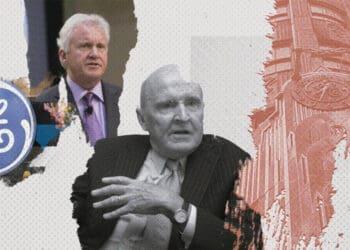This article was republished with permission from FCPAméricas Blog, for which Matteson Ellis is founder, editor and regular contributor.
Over the years, I have learned to count on a common reaction when discussing FCPA compliance in Latin America – “Well, you have corruption in the United States, too.”
Latin Americans are surprised to hear that the FCPA’s anti-bribery provisions address only foreign bribery – the payment of bribes to non-U.S. government officials. They often see the law as wrongly targeting foreigners, reflecting a lopsided approach to addressing corruption. To some, the FCPA demonstrates a U.S.-centric view of the world, suggesting that bribery is not a problem in the United States and is only an issue outside of its borders.
I have learned to address this viewpoint in a variety of ways.
- It is true, we certainly do have corruption in the United States. U.S. politicians are regularly caught committing such acts. Louisiana Congressman William Jefferson hid his stack of cash from kickbacks in his freezer. California Congressman Duke Cunningham lived rent-free on a yacht gifted by a defense-contracting firm. Illinois Governor Rod Blagojevich attempted to sell the U.S. Senate seat vacated by President Barack Obama and Virginia Governor Bob McDonnell and his wife accepted more than US$135,000 in gifts, travel and low-interest loans from a dietary supplement manufacturer. However, the United States also has strong domestic bribery laws to address these types of local bribery issues. The fact that the U.S. Congress created the FCPA to apply only to bribes paid to officials from other parts of the world does not suggest that preventing domestic bribery is not addressed forcefully under U.S. law.
- Indeed, corruption exists everywhere, no matter the country. Only, some have done a better job of addressing it. Countries with stronger government institutions find more effective ways of criminalizing public corruption and penalizing the culprits. The result is lower levels of impunity for those who choose to give and receive bribes. When the calculation changes of getting caught, behavior tends to change.
- To be sure, no matter how stringent a country’s anti-corruption laws, bribery cannot be prevented 100 percent of the time. The more relevant question is how a company, or a country, responds to the practice. Is bribery something that is institutionalized, or treated as an exception to the norm? When bribes are offered or requested, do the people involved feel threatened by the possibility of getting caught, or do they commit such acts with a sense of impunity, or even justification? Perhaps the answers to these questions are a differentiator between a country like the United States, where corruption is seen more as the exception, and many parts of Latin America, where a bribe might not be out of the norm.
- People in Latin America will understandably ask why lobbying in the United States is not considered a form of bribery. Indeed, it is hard to argue with the proposition that egregious lobbying has become commonplace in our country. By some, the practice certainly could be seen as an institutionalized form of corruption. The difference between lobbying and illicit bribery, however, is that many forms of lobbying common in our political process have been approved through a democratic lawmaking process. Elected representatives have decided that certain forms of paid political influence are acceptable, legitimate and legal. Furthermore, these types of payments are generally regulated. In this respect, lobbying differs from rampant and unlawful corruption that is unlawful.
This is a complicated and nuanced discussion to have in Latin America. But it is an essential one to have if FCPA compliance efforts are to be seen as legitimate, worthwhile and not one-sided. It is important to making compliance work in the region.
The opinions expressed in this post are those of the author in his or her individual capacity and do not necessarily represent the views of anyone else, including the entities with which the author is affiliated, the author`s employers, other contributors, FCPAméricas or its advertisers. The information in the FCPAméricas blog is intended for public discussion and educational purposes only. It is not intended to provide legal advice to its readers and does not create an attorney-client relationship. It does not seek to describe or convey the quality of legal services. FCPAméricas encourages readers to seek qualified legal counsel regarding anti-corruption laws or any other legal issue. FCPAméricas gives permission to link, post, distribute or reference this article for any lawful purpose, provided attribution is made to the author and to FCPAméricas LLC.



 Matteson Ellis serves as Special Counsel to the FCPA and International Anti-Corruption practice group of Miller & Chevalier in Washington, DC. He is also founder and principal of Matteson Ellis Law PLLC, a law firm focusing on FCPA compliance and enforcement. He has extensive experience in a broad range of international anti-corruption areas. Previously, he worked with the anti-corruption and anti-fraud investigations and sanctions proceedings unit at The World Bank.
Mr. Ellis has helped build compliance programs associated with some of the largest FCPA settlements to date; performed internal investigations in more than 20 countries throughout the Americas, Asia, Europe and Africa considered “high corruption risk” by international monitoring organizations; investigated fraud and corruption and supported administrative sanctions and debarment proceedings for The World Bank and The Inter-American Development Bank; and is fluent in Spanish and Portuguese.
Mr. Ellis focuses particularly on the Americas, having spent several years in the region working for a Fortune 50 multinational corporation and a government ethics watchdog group. He regularly speaks on corruption matters throughout the region and is editor of the FCPAméricas Blog.
He has worked with every facet of FCPA enforcement and compliance, including legal analysis, internal investigations, third party due diligence, transactional due diligence, anti-corruption policy drafting, compliance training, compliance audits, corruption risk assessments, voluntary disclosures to the U.S. government and resolutions with the U.S. government. He has conducted anti-corruption enforcement and compliance work in the following sectors: agriculture, construction, defense, energy/oil and gas, engineering, financial services, medical devices, mining, pharmaceuticals, gaming, roads/infrastructure and technology.
Mr. Ellis received his law degree, cum laude, from Georgetown University Law Center, his masters in foreign affairs from Georgetown’s School of Foreign Service, and his B.A. from Dartmouth College. He co-founded and serves as chairman of the board of
Matteson Ellis serves as Special Counsel to the FCPA and International Anti-Corruption practice group of Miller & Chevalier in Washington, DC. He is also founder and principal of Matteson Ellis Law PLLC, a law firm focusing on FCPA compliance and enforcement. He has extensive experience in a broad range of international anti-corruption areas. Previously, he worked with the anti-corruption and anti-fraud investigations and sanctions proceedings unit at The World Bank.
Mr. Ellis has helped build compliance programs associated with some of the largest FCPA settlements to date; performed internal investigations in more than 20 countries throughout the Americas, Asia, Europe and Africa considered “high corruption risk” by international monitoring organizations; investigated fraud and corruption and supported administrative sanctions and debarment proceedings for The World Bank and The Inter-American Development Bank; and is fluent in Spanish and Portuguese.
Mr. Ellis focuses particularly on the Americas, having spent several years in the region working for a Fortune 50 multinational corporation and a government ethics watchdog group. He regularly speaks on corruption matters throughout the region and is editor of the FCPAméricas Blog.
He has worked with every facet of FCPA enforcement and compliance, including legal analysis, internal investigations, third party due diligence, transactional due diligence, anti-corruption policy drafting, compliance training, compliance audits, corruption risk assessments, voluntary disclosures to the U.S. government and resolutions with the U.S. government. He has conducted anti-corruption enforcement and compliance work in the following sectors: agriculture, construction, defense, energy/oil and gas, engineering, financial services, medical devices, mining, pharmaceuticals, gaming, roads/infrastructure and technology.
Mr. Ellis received his law degree, cum laude, from Georgetown University Law Center, his masters in foreign affairs from Georgetown’s School of Foreign Service, and his B.A. from Dartmouth College. He co-founded and serves as chairman of the board of 









